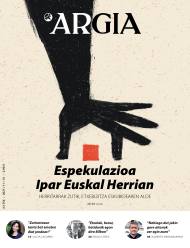Notes on immigration and nation
If we begin to think about migration, the first proof is that, before relating the issue to the national issue, there are other urgent issues, such as the situations of exploitation suffered by migrants in general in our country, or the relationship of the issue with relations of oppression worldwide. Having said that, I would like to connect immigration with the nation today.
If you want at an analytical level, migration is an ideal field for the study of nationalisms. In a way, immigration raises the relationship between the State and the nation; or, if preferred, they show us the bases that nationalisms use when thinking about their nation: who is the member of the nation, who has historically been thought to be a member of the nation, who has been expelled from that representation, etc. All this occurs through different means and resources, regardless of whether or not the nationalism under study has a State. But in both cases, immigration is a productive field of study. As Pierre Bourdieu recalled, the migrant is in a special social position, not entirely outside or completely inside, often between the native and the other.
"The challenge is to create an open discourse on the subject and complement these theoretical approaches with effective practices"
Moving the issue to Euskal Herria, the activity of Spanish and French nationalisms is invisible in this area, probably because this activity is naturalized. However, the position of nationalism is different, because many times it is part of a stigma: Basque nationalism, from its origin, created a national project closed to migrants – here many nuances can be made – and some simply underline it, with clear political objectives, academic works or audiovisual products. On the contrary, I believe that the evolution of nationalism must certainly be underlined; that is, the change that took place in the 1960s and 1970s, initially from left-wing nationalism, and the Basque national project, theoretically and in practice, opened the door to such abundant immigration at that time.
In the last fifteen years, especially in Hego Euskal Herria, the reality of immigration has changed a lot, highlighting other origins. The vast majority of new migrants lack official citizenship, which makes a fundamental difference compared to previous migration processes. But, in spite of everything, I believe that the response to previous migration periods should be an important reference. Nationalism renewed its national project, which also opened up migrants. It could be otherwise, but so it happened; and nation and immigration is the perfect starting point for thinking today, without falling into idealizations.
As underlined by the political scientist Eunice Romero on the Catalan process (Revista Talaia, number 10), talking about migration is also about nation, and the challenge is to create an open discourse on the subject and complement these theoretical approaches with effective practices. I believe that when we think about immigration in the Basque Country we should also take into account the national variable. Always delving into an open definition of the nation and, at the same time, without circumscribing the reflection on the nation to language, as we do on many occasions in the Basque Country. I believe that the actions of 50 years ago on this road are a treasure.
Bidali zure iritzi artikuluak iritzia@argia.eus helbide elektronikora
ARGIAk ez du zertan bat etorri artikuluen edukiarekin. Idatzien gehienezko luzera 4.500 karakterekoa da (espazioak barne). Idazkera aldetik gutxieneko zuzentasun bat beharrezkoa da: batetik, ARGIAk ezin du hartu zuzenketa sakona egiteko lanik; bestetik, egitekotan edukia nahi gabe aldatzeko arriskua dago. ARGIAk azaleko zuzenketak edo moldaketak egingo dizkie artikuluei, behar izanez gero.
There are those who, being a brilliant brain, with definitions of "little detail," are experts in transforming and transforming the same thing, in other words. It was yours and it has been a project in eternum that has been repeated for decades. This was one of the main reasons to... [+]
On 26 December, during an air strike, the Israeli Army killed five Palestinian journalists trying to reach the city. They killed 130 Palestinian journalists. This news has reminded me of a couple of things, the first, the persecution of true journalists in any part of the world,... [+]
In recent months I have had to work in a number of institutes and, at some point, I have had to talk to the students about the possibilities offered by the labour market. The typology of the students is varied and in the same city varies a lot from one neighborhood to another,... [+]
The girl who appears in the center of photography, which can hardly be considered historical, is writing a list of adjectives: I, you, he, we, you, they. Looking down, I couldn't see what his gaze looked like.
Insensitive to the work of the photographer, you, slowly and... [+]
When you work with older people or people with physical and neural diversity, you realize that the idea of competition in our society limits us a lot as a species. That is, our system puts you in value by doing things specifically, and what it doesn't do is incapable of the... [+]
I wanted to write for the Christmas lights and claim to become an annual tradition in this time of street lighting, a welcoming, joyful and joyful public space from the point of view of the class. But, of course, also warm public spaces where some young people can be warming up... [+]
He forgives the oak trees, oak trees, oaks, herons, strawberries, dressings, chestnuts, birch, gorostidias, chamomiles, pine trees and all the societies of the trees, but today the hayedo has a date on the occasion of the celebrations of the winter border.
It is easier for me... [+]
Euskaraldia comes back. Apparently, it will be in the spring of next year. They have already presented it and the truth is that it has surprised me; not Euskaraldia himself, but his motto: We'll do it by moving around.
The first time I have read or heard it, the title of the... [+]
When the heteropatriarchal capitalist colonial system is questioned and fought, it attacks mercilessly. Using all the tools at your disposal to strengthen, strengthen and consolidate institutional power, media, justice, language, culture, violence...
In Switzerland, where every... [+]
I do not know if you also have the same perception – I recognise this: here I have started to write in a scientific way. I am referring to the natural extension of the word laziness. I hear more and more in the corners of Hego Euskal Herria: Basque, Spanish and, of course,... [+]
Many at Christmas feel more lazy than illusion when we think about meals and family gatherings. But we anticipate that it is not food that makes us feel collectively uncomfortable, but the normativity that defines the traditional family. Moreover, we would dare to say that the... [+]
I have always found the way in Spanish to the carriages that can be found here and there: humiliating. Isn't it a pretty light, white name or doesn't it have any connotation? After all, everything that was going on there had to be humiliated. It is known that for the god of... [+]
The end of the Syrian Arab Republic has caused great surprise at the way in which it has taken place: fast and almost without resistance. However, it is not so strange when we consider that the country was destroyed, impoverished and trodden. Most Syrians have long been... [+]


















